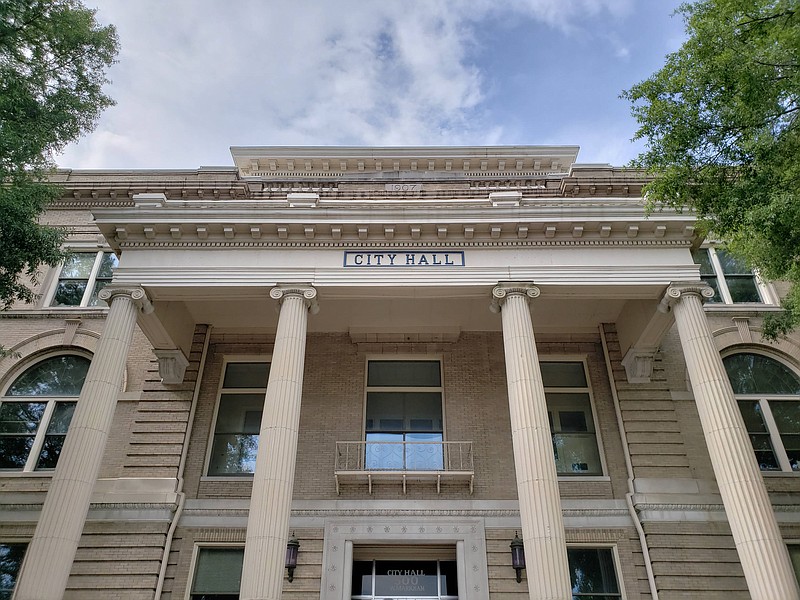Little Rock Mayor Frank Scott Jr. on Tuesday told members of the city's Board of Directors that his proposal to add a percentage point to the local sales-tax rate would generate approximately $53 million annually for a wide array of quality-of-life initiatives.
The tax increase would not have a sunset date, he said.
Last week, Scott during his virtual State of the City address asked residents to support a 1% sales-tax increase. On Tuesday, he said, "I think, in talking with each individual board member, there is a strong appetite for this sales-tax initiative."
The presentation delivered to city directors Tuesday is part of Scott's second attempt to get the tax increase approved.
A similar proposal from the mayor last year was abandoned in March 2020 because of the covid-19 outbreak. At the time, the proposal was estimated to produce about $50.5 million in new annual revenue.
During Tuesday's meeting, Scott said he wanted to go before the board with the proposal immediately after his State of the City address. He indicated that he wanted board members to take a vote on the proposal as soon as possible.
Capital projects are expected to be completed within the first 10 years, according to his presentation.
The largest share of the new revenue, roughly 34%, would go to parks, golf and fitness projects during the first decade.
Estimated annual allocations for parks under the proposal include an additional $2.1 million for general park improvements and maintenance, plus $750,000 for golf operations and maintenance.
Approximately $30 million over the first 10 years has been proposed for capital investment toward Hindman Park and War Memorial Park. Under the plan, War Memorial is envisioned as the "Central Park" of Little Rock, and the proposal mentions new baseball fields, trail connections, a dog park and pavilion areas.
A $20 million investment would create an interactive giraffe habitat at the Little Rock Zoo, and $10 million would be put toward a North American habitat exhibit within the zoo.
Approximately $37 million in capital investment plus $8 million in new operating expenses would go toward a new indoor sports complex over the next decade. Construction of the complex is expected to be completed by 2025, according to the proposal.
At 12%, funding for public safety initiatives represents the second-largest share of the new expected revenue over the first 10 years.
Public safety initiatives would be expected to receive an annual average allocation of more than $6.6 million as a result of the tax increase, including a capital investment of $8.5 million for a new fire station in west Little Rock.
Additionally, the mayor has proposed spending more than $26 million over 10 years for the replacement of public safety vehicles.
Approximately $45 million over the first 10 years of the tax increase would be allocated for early-childhood education.
The city's finance director, Sara Lenehan, told board members that because not every initiative may begin in the first year of the sales-tax increase, operating costs may follow later for certain items. Projects may be accelerated by short-term financing, she said.
Scott's proposal also contains the outline of an oversight framework.
A resident-led committee would meet on a quarterly basis to get project updates and would make recommendations to the mayor and city manager on future projects and funding reallocation. Public hearings would be held to discuss current and future projects.
The city board would approve a resolution setting priorities and reallocating funds every 10 years, according to the proposal. The mayor would introduce the resolution.
Scott said he was referring to the proposal as a 1% increase but acknowledged that technically the increase to the city's sales-tax rate would be slightly more than half a percentage point as a result of an expiring capital-projects tax.
"But it's just simpler to say a penny," Scott said.
Because an existing 0.375% city sales tax to support capital projects expires at the end of December, the effective change to the city's sales-tax rate would be an increase of 0.625 percentage point in 2022 if voters approve the mayor's sales-tax increase later this year.
The overall city sales-tax rate would become 2.125%. When accounting for state and county sales taxes, Little Rock consumers would pay 9.625% on most purchases.
Despite the penny-increase label, the tax increase would result in the addition of more than just 1% onto a customer's purchase price in nearly all cases.
Although it depends on precisely when the measure went into effect, consumers would most likely experience the tax increase as 0.625% added on top of the existing sales-tax rate in Little Rock, meaning they would assuredly pay more than a penny in light of every additional dollar they spent.
Members of the Board of Directors must vote to send the proposed sales-tax increase to voters. Scott did not mention during Tuesday's meeting the expected timing of the election that would serve as a referendum on the tax increase.
